South Korean women are not safe from the second “Nth Room”

All over social media, South Korean women are translating articles about deepfake porn chat rooms. No woman is safe from becoming a victim of deepfake porn in South Korea—not even acquaintances, minors, and female family members are spared.
Even female journalists who cover the issue about the “second Nth Room” are also being threatened with deepfake porn. You might be wondering, “Why are these vile men so bold? What is the ‘second Nth Room’? Why are South Korean women starting to share their experiences online?”
The outcry of feminists in South Korea led me to a deep dive at Naver (South Korea’s Google). Disgust isn’t enough to describe what I feel due to what I’ve seen about the deepfake issue plaguing the country. In fact, as of 2023, South Korea leads in the production of deepfake porn worldwide. The second Nth Room issue is a reflection of this sickening reality.
What is the second Nth Room?
The term “second” Nth Room implies the existence of a first. In 2019, a network of Telegram chat rooms that coerced and sexually exploited women was busted by journalists and South Korean police. Women and even girls as young as middle school age were threatened to film and photograph themselves in sexually compromising situations. Perpetrators sold the material in the Nth Room group chats on Telegram. Although Moon Hyung-wook (Alias: God God), the creator of the Nth Room, was caught, substantial laws regarding cyber-sexual exploitation haven’t been passed.
For that reason, the second Nth Room now exists. Perpetrators can easily delete traces of their digital activity, making it difficult for authorities to hold them liable for the crime of deepfake porn distribution. Deepfake pornography is only punishable when shared in South Korea. Additionally, Telegram is not cooperative with the investigation.
The second Nth Room has over 200,000 active participants and is composed of multiple chatrooms on Telegram. In this rendition of the Nth Room, perpetrators deepfake pornography of women. These women aren’t strangers—not that a lack of personal relationships would make this alright. What makes this case shocking is that these women are often acquaintances, family members, and intimate partners of those creating the deepfakes. The intention of these chat rooms is clear: It’s to humiliate the women whose images are being circulated. Thus, these rooms are also called “humiliation rooms.”
Again, middle school girls are also victimized in these chat rooms. Juvenile perpetrators as young as fourteen years old were caught participating in this deepfake pornography distribution network. Prestigious South Korean universities such as Seoul National University, Korea University, and Yonsei University have victims. The situation has become dire, to the point that South Korean women fear posting selfies on their social media accounts.
Feminism is vilified in South Korea
In South Korea, feminism often raises backlash. To identify as a feminist—to advocate for gender equality—can lead to being ostracize and bullied. It doesn’t matter if female journalists cover the issue of sexual violence. Female journalists involved in covering the Burning Sun scandal received backlash and threats from men because they covered the case. Additionally, women are often expected to take personal responsibility to “prevent” victimization.
According to a report by CNA, anti-feminist male voters express their desire to abolish the Gender Equality Ministry. Furthermore, conservative politicians like Lee Jun-seok claim that the deepfake issue in South Korea is merely “exaggerated.” Never mind that South Korea leads in the production of deepfake porn by 53% globally.
South Korean women are fighting back
For the reasons above, women in South Korea are shedding light on the issue by translating articles online and sharing them on social media platforms. They want the international community to know about the issue so that the government and the police are pressured to address deepfake pornography crimes. On September 1, 2024, South Koreans online will trend hashtags on Twitter to demand the government release the identities of the perpetrators involved.
All these women are asking for is awareness on your end. Share their plight on your social media accounts, because most of them can’t do it without fear.
Have a tip we should know? tips@themarysue.com